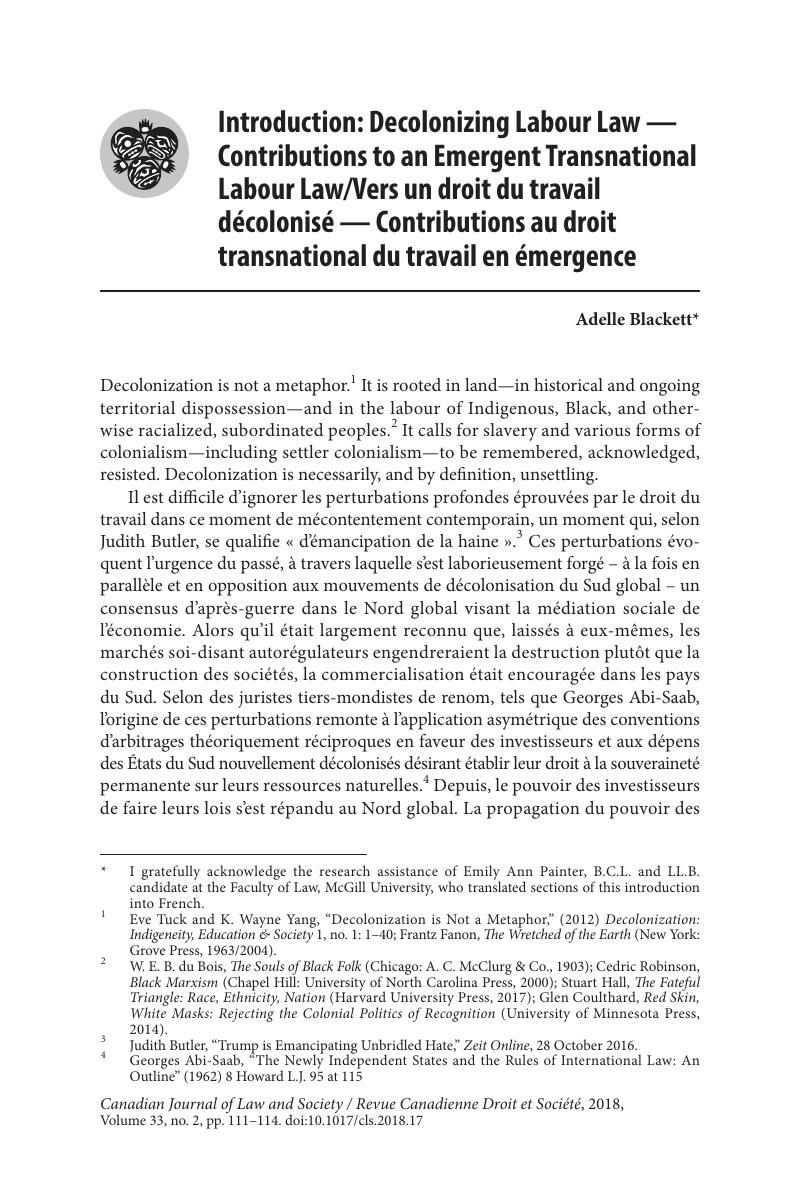Published online by Cambridge University Press: 05 September 2018

I gratefully acknowledge the research assistance of Emily Ann Painter, B.C.L. and LL.B. candidate at the Faculty of Law, McGill University, who translated sections of this introduction into French.
1 Tuck, Eve and Wayne Yang, K., “Decolonization is Not a Metaphor,” (2012) Decolonization: Indigeneity, Education & Society 1, no. 1: 1–40;Google Scholar Fanon, Frantz, The Wretched of the Earth (New York: Grove Press, 1963/2004).Google Scholar
2 du Bois, W. E. B., The Souls of Black Folk (Chicago: A. C. McClurg & Co., 1903);Google Scholar Robinson, Cedric, Black Marxism (Chapel Hill: University of North Carolina Press, 2000);Google Scholar Hall, Stuart, The Fateful Triangle: Race, Ethnicity, Nation (Harvard University Press, 2017);CrossRefGoogle Scholar Coulthard, Glen, Red Skin, White Masks: Rejecting the Colonial Politics of Recognition (University of Minnesota Press, 2014).CrossRefGoogle Scholar
3 Butler, Judith, “Trump is Emancipating Unbridled Hate,” Zeit Online, 28 October 2016.Google Scholar
4 Georges Abi-Saab, “The Newly Independent States and the Rules of International Law: An Outline” (1962) 8 Howard L.J. 95 at 115
5 Sven Beckert, Empire of Cotton 438 (2015).
6 Nancy Fraser, “A Triple Movement? Parsing the Politics of Crisis after Polanyi” (May-June 2013) 81 New Left Review 119 at 124; Nancy Fraser, “From Exploitation to Expropriation: Historic Geographies of Racialized Capitalism” (2018) 94:1 Economic Geography 1.
7 Mamdani, Mahmood,Citizen and Subject: Contemporary Africa and the Legacy of Late Colonialism (Princeton University Press, 1996).Google Scholar
8 Tuck and Yang, 6–7; Chanook, Martin, Making of South African Legal Culture, 1902–1936: Fear, Favour, and Prejudice (Cambridge University Press, 2001).CrossRefGoogle Scholar
9 Blackett, Adelle, “Decolonizing Labour Law: A Few Comments” Bulletin for Comparative Labour Relations 92 (2016): 89–99.Google Scholar
10 Khan, Sabaa Ahmad, “Struggles and Actions for Legal Space in the Urban World: The Case of Informal Economy E-Waste Workers,” Canadian Journal of Law and Society 33, no. 2 (2018): 115–135.Google Scholar
11 Seck, Sara, “Labour and Environment in Business and Human Rights: Beyond the Bounded Autonomous Worker,” Canadian Journal of Law and Society 33, no. 2 (2018): 137–57.Google Scholar
12 Martin, Isabelle, “The Use of Transnational Labour Law in Steering Socially Responsible Corporate Governance toward Increased Workers Protection,” Canadian Journal of Law and Society 33, no. 2 (2018): 159–76.Google Scholar
13 Khan, Zobaida, “Transnational Labour Governance: A Critical Review of Proposals for Linkage through the Lens of the Rana Plaza Collapse in Bangladesh,” Canadian Journal of Law and Society 33, no. 2 (2018): 177–97.Google Scholar
14 Adanhounme, Armel Brice, « La citoyenneté corporative entre libéralisme et démocratie: les individus ou leur communauté? », Revue canadienne de droit et société 33, no. 2 (2018): 199–221.Google Scholar
15 Gallerand, Elsa & Gallié, Martin, « Travail non libre et rapports sociaux de sexe. À propos des programmes d’immigration temporaires », Revue canadienne de droit et société 33, no. 2 (2018): 223–41.Google Scholar
16 Hastie, Bethanie, “The Inequality of Low-Wage Migrant Labour: Reflections on PN v FR and OPT v Presteve,” Canadian Journal of Law and Society 33, no. 2 (2018): 243–59.Google Scholar
17 Smith, Adrian, “Temporary Labour Migration and the ‘Ceremony of Innocence’ of Postwar Labour Law: Confronting ‘the South of the North,’” Canadian Journal of Law and Society 33, no. 2 (2018): 261–77.Google Scholar
18 Adelle Blackett, Global Justice in Transnational Labour Law: A Review of Global Justice and International Labour Rights, ed. Yossi Dahan, Hanna Lerner, and Faina Miman-Sivan (Cambridge University Press, 2016), Canadian Journal of Law and Society 33, no. 2 (2018): 279–87.
19 Simpson, Audra, Mohawk Interruptus (Duke University Press, 2014).CrossRefGoogle Scholar
20 It is important to acknowledge those who have worked to ensure space for alternative narratives to emerge. See generally Archer, Simon, Drache, Daniel, and Zumbansen, Peer ed., The Daunting Enterprise of the Law: Essays in Honour of Harry W. Arthurs (Montreal and Kingston: McGill-Queen’s University Press, 2017).CrossRefGoogle Scholar
21 Harding, Vincent, “The Vocation of the Black Scholar and the Struggles of the Black Community,” in Education and Black Struggle: Notes from the Colonized World, Institute of the Black World (Harvard Educational Review, 1974), 25.Google Scholar